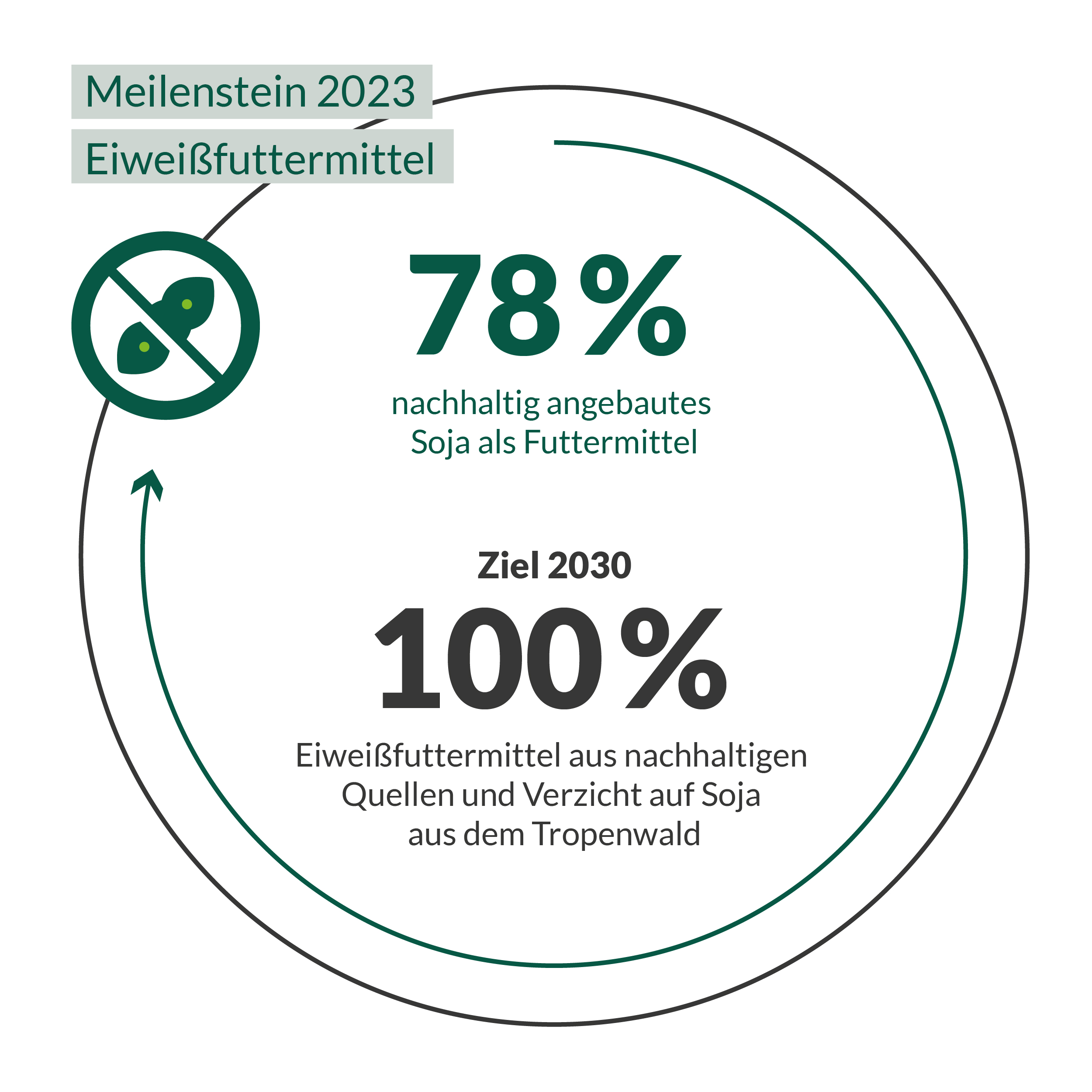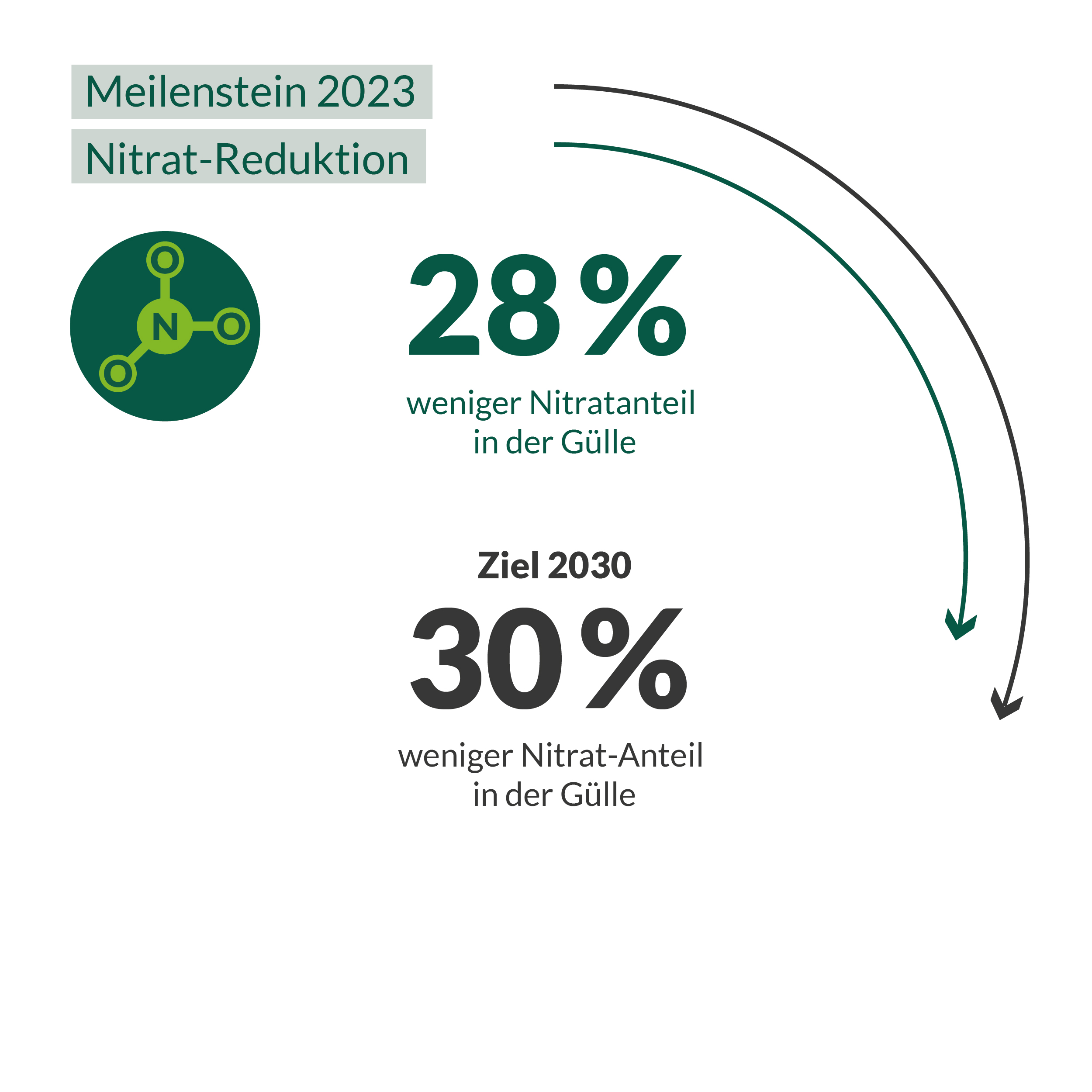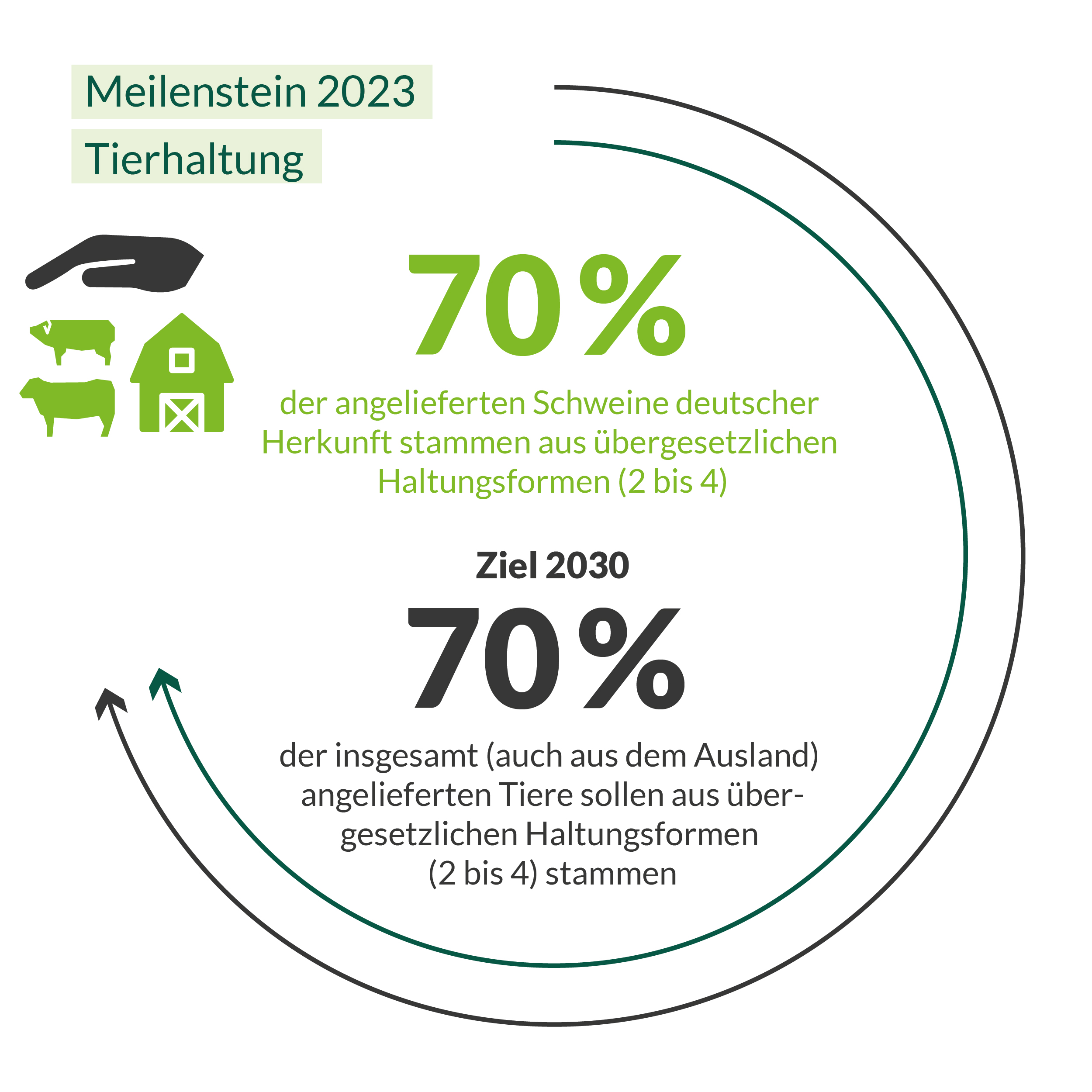Agenda t30
Nachhaltig Lebensmittel produzieren
Wir übernehmen Verantwortung für die Ernährung von heute und die Welt von morgen. Unsere Lebensmittel leisten heute einen Beitrag dazu, natürliche Kreisläufe zu erhalten, das Klima und natürliche Ressourcen zu schützen und sozialen Zusammenhalt zu schaffen. Daran arbeiten wir weiter und setzen uns ambitionierte Ziele: Bis 2030 werden wir einer der nachhaltigsten Lebensmittelproduzenten in Europa sein. Unser Antrieb ist es, nachhaltig Lebensmittel zu produzieren.
Nachhaltigkeits-Strategie
Natürliche Kreisläufe und eine intakte Umwelt sind Voraussetzungen unserer Ernährung. Nach dieser Überzeugung produzieren wir seit 50 Jahren qualitative Lebensmittel für eine gesunde, genussvolle Ernährung von Millionen Konsumenten. Anfang 2020 haben wir unser Nachhaltigkeitsmanagement mit einer konkreten Zehn-Jahres-Strategie, der Agenda t30, ergänzt. Damit beschleunigen wir unsere Arbeit auf dem Weg zur Produktion nachhaltiger Lebensmittel.
Tönnies hat dafür messbare Ziele definiert. Im Folgenden stellen wir Ihnen eine Auswahl an Meilensteinen im Hinblick auf die definierten Ziele vor.
Hier geht es zum t30-Update.


Verzicht auf Soja aus dem Tropenwald
Unser Ziel:
Zu 100% auf Soja aus Südamerika verzichten.
Unser Meilenstein:
Im Jahr 2023 stammen bereits 78% des Eiweißfutters aus nachhaltigen Quellen. Spätestens Ende 2023 setzen wir bei der Fütterung der Schweine in Deutschland ausschließlich auf Soja aus entwaldungsfreier Herkunft. Mit unseren landwirtschaftlichen Erzeugern und führenden Futtermittelherstellern arbeiten wir weiter an Lösungen, um die Fütterung in Zukunft noch nachhaltiger zu gestalten.

Reduktion von Nitrat in der Gülle
Unser Ziel:
Den Nitrat-Anteil in der Gülle um 30% reduzieren (ggü. dem Stand von 2005).
Unser Meilenstein:
Im Jahr 2023 konnten wir eine Reduktion des Nitrat-Anteils um 28% im Vergleich zu 2005 bewirken. Dazu trägt unser TONISO-Fütterungskonzept bei. Bei diesem reduzieren Landwirte die Eiweißkomponenten im Futter. Durch diese Maßnahme wird die Gülle „dünner“ und der Nitrat-Anteil reduziert.

Tierwohl-Standards erhöhen
Unser Ziel:
70% der angelieferten Tiere (auch aus dem Ausland) sollen aus übergesetzlichen Haltungsformen (2-4) stammen.
Unser Meilenstein:
Im Jahr 2023 stammen bereits mehr als 70% der angelieferten deutschen Tiere aus übergesetzlichen Haltungsformen (2-4). Wir unterstützen Innovationen zum Um- und Neubau der neuen Haltungskonzepte und setzen uns für eine entsprechende Vermarktung ein. Wir werden diesen Weg konsequent fortsetzen..

Reduktion von erdölbasierten Kunststoffen
Unser Ziel:
70% weniger erdölbasierte Kunststoff-Verpackungen im Gesamtverpackungsmaterial der Tönnies-Gruppe verwenden (ggü. dem Stand von 2017).
Unser Meilenstein:
Im Jahr 2023 haben wir in unserem Geschäftsbereich Convenience im Vergleich zu 2017 21% weniger erdölbasierte Kunststoffverpackungen im gesamten Verpackungsmaterial verwendet. Mit der Einführung der Flow-Pack-Verpackung für einen Großteil des SB-Sortiments können massive weitere Reduktionsschritte umgesetzt werden.

CO2-Einsparung in der Logistik
Unser Ziel:
50% weniger CO2-Emissionen im Bereich Straßentransport (ohne Container) für unsere Hauptstandorte (Rheda-Wiedenbrück, Sögel und Weißenfels) je Tour (ggü. dem Stand von 2015).
Unser Meilenstein:
Im Jahr 2023 haben wir im Vergleich zu 2015 34% weniger CO2– Emissionen im Bereich Straßentransport (ohne Container) für unsere Hauptstandorte (Rheda- Wiedenbrück, Sögel und Weißenfels) je Tour ausgestoßen.

Ressourcenschutz
Unser Ziel:
90% des Strommixes in den Tönnies- Produktionsbetrieben aus erneuerbaren Energien gewinnen.
Unser Meilenstein:
Im Jahr 2023 wurden in den Tönnies-Produktionsbetrieben 64% des Strommixes aus erneuerbaren Energien gewonnen.

Schaffung von Wohnraum
Unser Ziel:
Langfristig allen interessierten Mitarbeiterinnen und Mitarbeitern Wohnraum nach einem fest definierten Standard zur Verfügung stellen.
Unser Meilenstein:
Insgesamt haben wir den vergangenen Jahren Wohnplätze für alle interessierten Mitarbeiterinnen und Mitarbeiter nach fest definierten Standards geschaffen. Aktuell verantworten wir einen Bestand von gut 4500 Plätzen. Dazu hat die Tönnies-Gruppe inzwischen einen hohen zweistelligen Millionenbetrag investiert.

Wir treten in den Nachhaltigkeitsdialog mit unseren Stakeholdern
Tönnies hat schon immer seine Position zu diversen Nachhaltigkeitsthemen wie Tierwohl, Arbeitsbedingungen oder Ressourcenverbrauch in der Öffentlichkeit vertreten und sich dem kritischen Dialog gestellt. Dabei haben wir stets die Verantwortung für unser Handeln übernommen. Deshalb sind Werte wie Zuverlässigkeit, Fairness, Respekt und Offenheit fest in unserer Strategie verankert.
Unser Handschlag gilt und ist verbindlich. Die Tönnies-Handschlags-Mentalität ist bei Kunden, Mitarbeitern und Partnern bekannt und ein hoher Vertrauensbeweis. Deshalb halten wir unsere Zusagen immer verpflichtend ein.
Als Familienunternehmen denken wir in Generationen. Unser Handeln und Tun ist fair und verbindlich. Für uns zählt nicht der kurzfristige Profit, sondern eine mittel- und langfristige, wirtschaftlich erfolgreiche Entwicklung, die auf Fairness gegenüber Kunden, Mitarbeitern und Partnern basiert. Ein transparenter, nachvollziehbarer und ehrlicher Umgang prägt dabei unser Handeln.
In unserem Unternehmen arbeiten Menschen aus vielen Nationen der Welt. Auch Kunden und Geschäftspartner sind weltweit verteilt. Respekt ist unser Maßstab und Anspruch im Umgang miteinander. Dabei spielen weder Position, Nationalität, Sprache, Religion noch die geschlechtliche Orientierung eine Rolle. Vielmehr ist unsere Maxime das respektvolle Miteinander auf Augenhöhe. Auch im Umgang mit Tier und Umwelt.
Im Rahmen unserer Dialogangebote berichten wir nicht nur über unsere Ziele und Erfolge, sondern thematisieren auch die Herausforderungen und Hindernisse – offen, respektvoll und fair.
Fragen Sie uns!
Dialog ist uns wichtig. Deshalb wollen wir Ihre Fragen hören und uns mit den Themen auseinandersetzen, die Sie beschäftigen. Schreiben Sie uns und unsere Fachleute werden Ihre Fragen an dieser Stelle beantworten. Bei inhaltsgleichen Fragen werden die Antworten von uns gebündelt.
Gerne zeigen wir Ihnen auch vor Ort an unseren Standorten, was wir machen und wie wir handeln. Jedes Jahr führen wir mehrere tausend Besucher durch unsere Standorte. Kontaktieren Sie uns direkt über das Formular, wenn Sie sich für einen Besuch bei uns interessieren.

